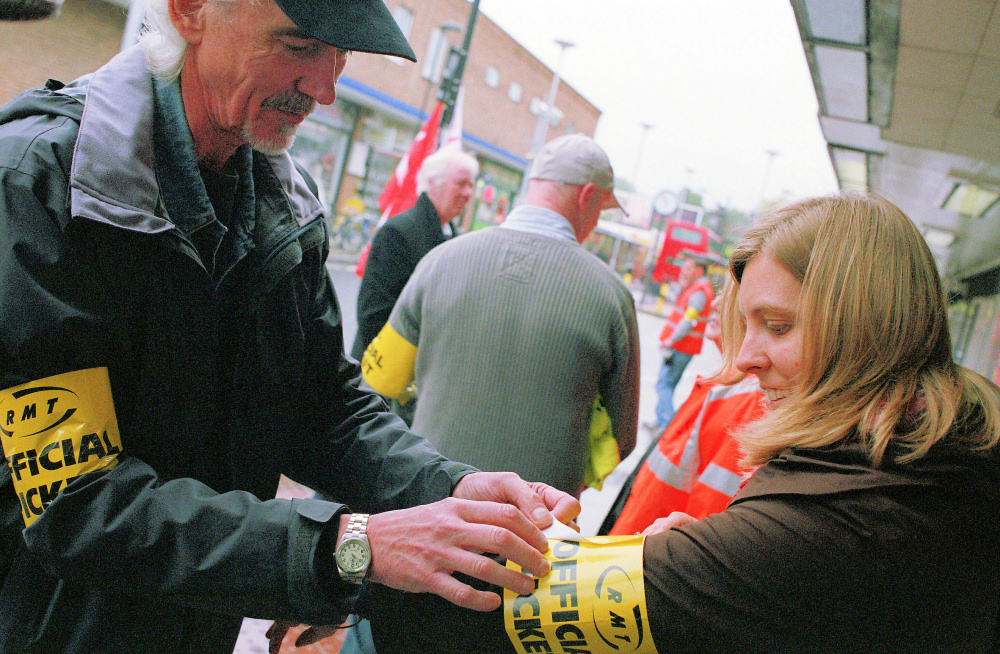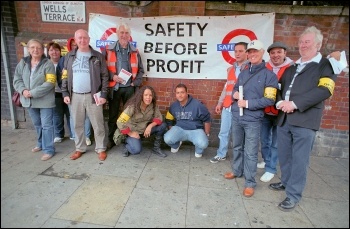The message sent round the London RMT and TSSA picket lines at 7am on 29 November, the fourth day of strike action against massive job cuts, was: “114 stations closed – pretty much the whole of central London – this is the most shut down at this time on any of the four strikes. Every line suspended and all with special time-table. I think we can safely say this is the most well supported out of the four days of action.”
Paula Mitchell
Pickets thought that a bitterly cold Monday morning had put off “volunteers” – but mostly the reason why fewer managers, administrators and non-RMT and TSSA members are volunteering to scab is because now their jobs are under threat too.
The dispute has reached a new level, with three weeks of negotiations in ACAS leading to no real progress. Management still insists that any ticket office that deals with less than 30 tickets an hour is unviable. This is when the national average is 12, and the London Underground average is 15! The bosses have even refused an offer to go to binding arbitration.
They demand that the union suspends all strike action and all action short of a strike for six weeks while they review the service; but they refuse to suspend their implementation of cuts! Pickets now agree that if there is no movement after this fourth strike day, the strike needs to be escalated.
On the Victoria picket line the discussion ranged from support for the student protests to the importance of getting a serious leadership reinforced in the London council of executive elections, with pickets deciding that they needed to vote for Lewis Peacock.
Around the picket lines
Over 60% of trains were cancelled, with many rank and file Aslef members refusing to cross the picket line.
Already the swingeing cutbacks have left many stations unstaffed or severely understaffed thus affecting the safety of the travelling public.
Many people have expressed their support especially the visually impaired who rely on staff to get around the busy network, which has seen a recent 6% increase in passenger numbers.
The public want a fully staffed underground, which is necessary to cope with the 3.5-4 million passengers who use this vast rail network every day.
Boris Johnson became Mayor of London with a pledge to end striking on the tube. But his inept and vicious job-cutting tactics have sparked 13 strikes and have forced TSSA into their first strikes since the 1926 general strike.
RMT/TSSA want a settlement, we want a fully staffed and safe underground system, but if necessary we will escalate the strike with a two or three day strike from 4 January 2011.
Reg Johnstone, RMT
At London Bridge station the pickets’ good spirits survived the cold weather, buoyed up by the number of commuters that stopped to support them.
All were very keen for coordinated strike action in the New Year. “What if we, the firefighters and the students all came out on the same day!”
RMT and TSSA members commented on how good it was to see so many students and school students taking action, and criticised the way most of the media coverage was trying to portray them as violent.
They were taking heart from the student protests here, the mass demonstration against the cuts in Dublin at the weekend and the general strike in Portugal.
Naomi Byron
An RMT rep at Leytonstone tube station spoke to Sarah Wrack: “We’ve been the first union to be taken on by this government – with a deliberate policy of smashing our union.
“We’re obviously in the forefront of this struggle which is going to gradually work its way through the entire working class.
“But we’re the ones they’ve decided to start on – us and the firefighters – we’re in the front line, and it feels like we’re in the front line as well! So we’ll continue to fight and hopefully get support from more and more organisations like the Socialist Party.
“The student protests over the past few weeks have suddenly emboldened a lot of young people which is very important for us because they are the generation that is going to be most affected by all the cuts, not just on the underground but all the other public services.
“So they are part of the reason we’re fighting at the moment and they’re now coming on board with us as well.
“We’d be delighted to welcome more students onto our picket lines and into our struggle.”









